How young men are beefing up their diets









Introduction
Mind the gender gap: The hidden bias in environmental research
What’s on our plate: Understanding the bigger picture
Meat and masculine stereotypes
Why are young men eating more meat now?
Widening the menu: How can we encourage young men to eat less meat?
Carving a new path: Final thoughts on a plant-forward future

As the UK’s Climate Change Committee put it recently, we need to cut our meat consumption by “two kebabs’ worth” per week1. It was phrasing that seemed geared specifically towards men—the boozy night-out kebab being such a trope of British male culture. Nevertheless, the message is clear: achieving our net zero targets requires a shift in how much meat and dairy we all eat.
Currently, UK meat consumption is double the global average, with many adults exceeding recommended intakes of red and processed meat. The CCC recommends a 20% reduction in meat and dairy by 2030 and 35% reduction for meat by 2050, eating better meat and plantbased alternatives.1 For a nation that grew up on chicken and chips and a weekly spag bol, this is a big shift, and it requires a subtle approach.
It’s a challenge Hubbub’s been working on for nearly a decade, from encouraging die-hard football fans in Manchester to make tactical substitutions with plant-based swaps, to helping M&S customers find the joy in plant-forward diets.
The good news is that we’re already seeing a positive shift. Over the years, the UK has steadily been reducing its meat consumption— the average Brit bought 857g of meat per week in 2023, down from over 1kg in 2000.2 That’s roughly equivalent to one kebab fewer per week. But it’s not as straightforward a story as it might seem. While meat consumption has been in a slow, long-term decline—decreasing 17% between 2008 and 20193 the national picture is masking a significant divergence amongst one group: young men.
1 Climate Change Committee, February 2025
2 Defra Family Food survey, 2023. Total of ‘carcass meat’ and ‘non-carcass meat and meat products’
3 National Diet and Nutrition Survey (NDNS), 2019



This report, compiled by environmental charity Hubbub with help from the British Nutrition Foundation, Beyond Equality and The 7 Stars, looks at the complex connection between meat consumption and masculinity, considering both societal factors and online influences. We explore the growing gap in eating habits between genders, the impact of lockdown, and the role of influencers promoting meat-heavy standards of masculinity.
This research and our recommendations are intended to help those working on healthy and sustainable diets, youth culture and beyond. We hope that it will help inform responses across sectors.
We’ve looked at this generation of young men at a macro-level to get an overall picture of trends, but we recognise they are not a homogenous group. Cultural backgrounds play a huge role in our dietary choices, and more research is needed to really understand the impact of these and other factors. This report identifies a number of intersectional themes, drawing from both literature and polling. We see huge opportunity in running further in depth research with this audience to explore these themes in more depth and develop effective, practical solutions.
The polling cited in this report is nationally representative and conducted by Censuswide on behalf of Hubbub, with a total of 12,013 respondents surveyed across four waves between May 2023 and November 2024.
Polling conducted over a two-year period by Hubbub has found that young men aged 16-24 are twice as likely to claim that they’ve increased their meat consumption year-on-year than men of all other ages, and nearly three times more likely than the general population.
Over 40% of young men eat meat daily, and around the same number are unwilling to cut back.
%
Men
Men (of other ages) 39%
Is this a sign that meat reduction trends are reversing in this demographic?
What does it mean for the food industry, and its climate and nature targets, if meat is back on the menu in a big way?
Does this trend reflect a wider lack of interest in sustainability among young men?
General population

And how might it be linked to resurgence of traditional ideas about masculinity in this age group?

40%of young men eat meat daily

recommendations that we think could help businesses, policymakers and NGOs to counter the trend:


Studies exploring the link between dietary choices and climate action can overrepresentparticipants.female
Many of us have accepted the idea that Gen Z are leading the charge when it comes to environmentally conscious eating. As a group, they’re almost twice as likely to be vegan or vegetarian compared to the general population.4 But our research has uncovered a gap: studies exploring the link between dietary choices and climate action can overrepresent female participants.

In some cases, we discovered studies categorised as ‘young adults’ skewed heavily towards young women, with female participation reaching as much as 88%.5 This, coupled with the fact that women and girls are more likely to adopt and maintain plant-based diets, raises a crucial question: are all genders being adequately represented?
4 Hubbub polling May 2023 - November 2024 (12,013 respondents)
5 Sharps et al., 2024

Globally, we farm over 80 billion land animals,6 and this comes with a massive environmental impact: animal farming is responsible for 14.5% of global emissions.7 And whilst we often focus on emissions, the impact of livestock farming goes much deeper, affecting land and biodiversity in significant ways. In the UK, livestock farming uses 85% of our food-related land yet supplies only 32% of our calories.8
Across Europe, farming, hunting, and fishing are all significant factors in species decline. And globally, industrial meat production is a leading cause of deforestation and wildlife loss, largely due to the soy production needed for animal feed. Then there’s water pollution— agriculture, particularly dairy and egg farming,9 plays a substantial role in polluting our waters.
14.5%
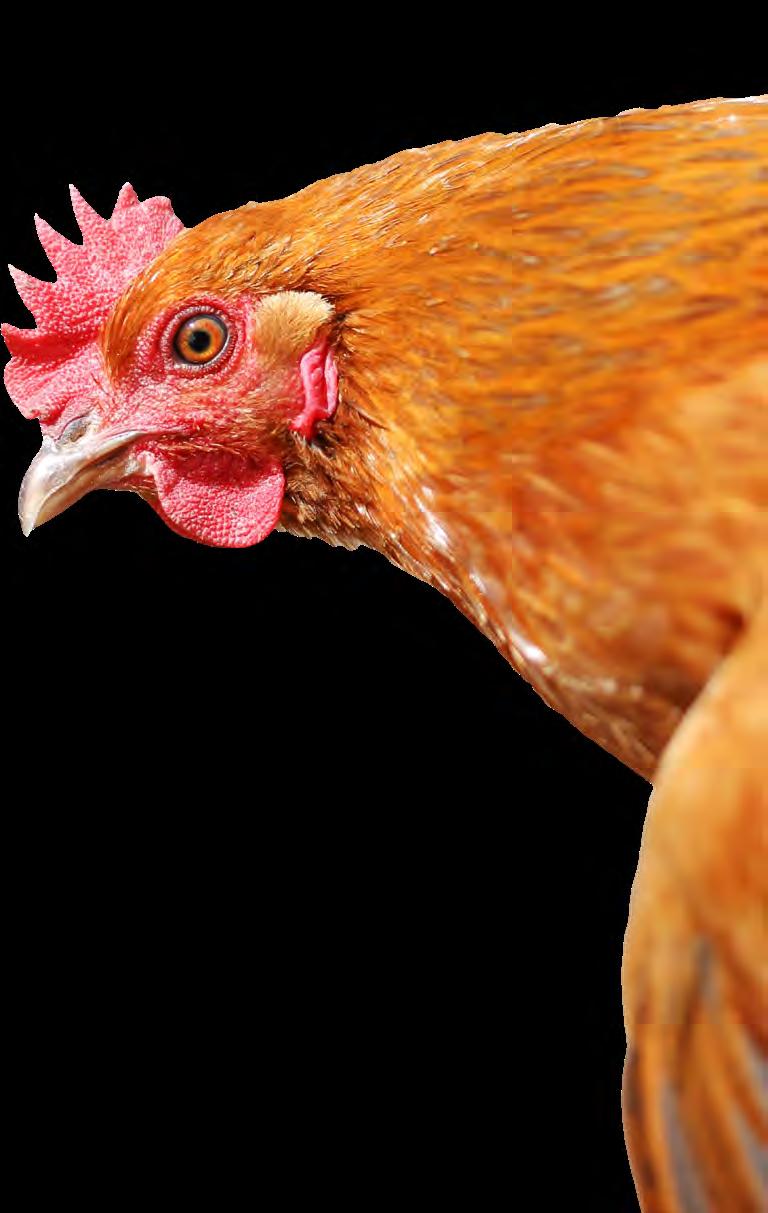

80 animals farmed globally of global emissions down to animal farming of UK’s food-related land is used by livestock farming, supplying only 32% of our calories
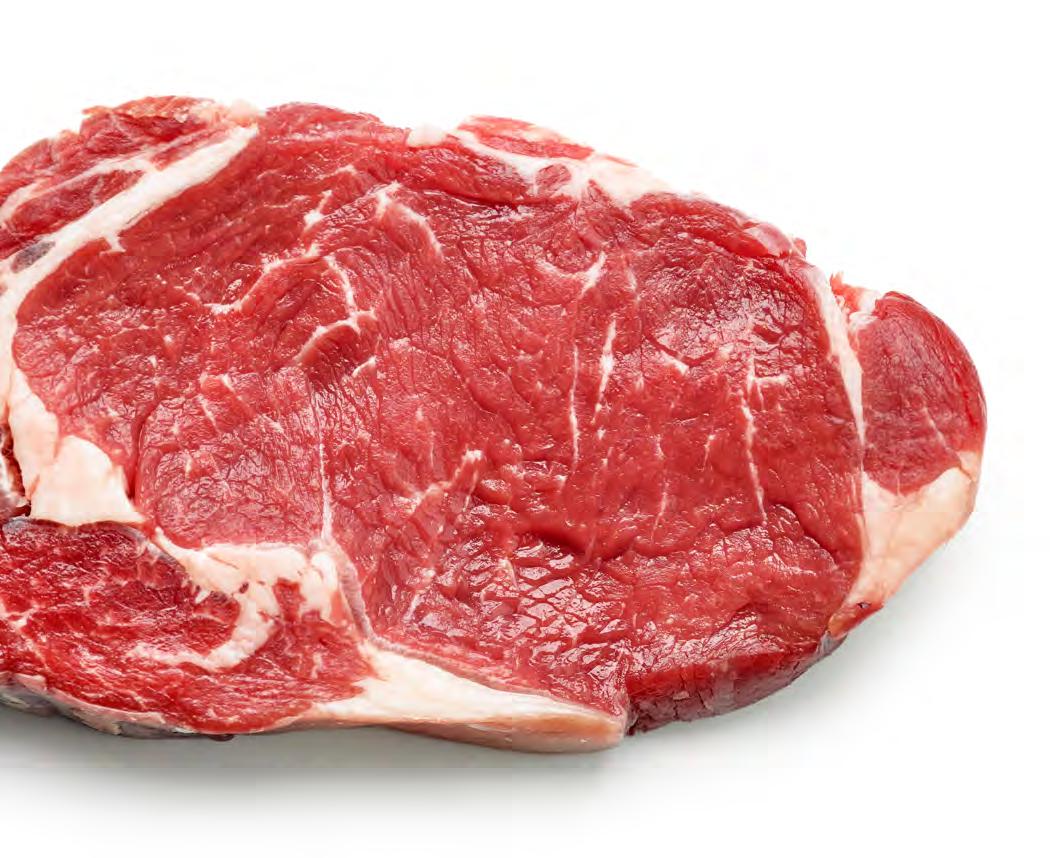
A view from the British Nutrition Foundation: why should we be concerned about high red and processed meat intake?
It’s widely recognised that poor diets are a major contributor to global health problems like obesity and diseases such as heart disease, type 2 diabetes, and some cancers. Healthy diets focus on lots of plantrich foods—vegetables, beans, lentils, fruits, whole grains, nuts and seeds—and less sugar, salt and saturated fat, which you find in fatty and processed meats, refined grain products, sugary foods and drinks. Shifting to such diets would improve population health and would also benefit the environment.
Animal-based foods can be part of a healthy, balanced diet and are a source of several important nutrients. Still, in developed countries, health and environmental bodies suggest cutting back on meat, particularly for those who eat a lot of it. Surveys— such as the UK National Diet and Nutrition Survey (NDNS)—indicate that men tend to consume higher amounts of meat than women, and the same is true for younger people, compared to older, adults.
High consumption of red and processed meat is linked to increased colorectal cancer risk. The evidence for processed meat is even stronger, and this can contribute more saturated fat and salt than red meat. Notably, the risk of colorectal cancer is higher in men; in 2022, male incidence rates for colorectal cancer were 44% higher than female rates. Rates of bowel cancer have been also rising among younger adults, with poor diet and obesity suggested as contributing factors, though more research is needed to confirm this.
The British Nutrition Foundation exists to promote health and wellbeing and prevent diet-related ill health through evidence-based nutrition science. For more information visit nutrition.org.uk.


It’s often said that we are what we eat. Food has long acted as a conduit for our social and personal identities, and rarely more so than when we look at some young men and their relationship with meat.
A 2022 study of Reddit conversations between vegan and non-vegan men found that buying meat in a supermarket (as opposed to ‘catching your own prey’) was often seen as cowardly.10 And whilst we might raise an eyebrow at the idea men are feeling sheepish about picking up a pack of sausages at Sainsbury's, it hints at a truth that’s more emotional than logical: acquiring meat is, for some, a way to perform masculinity.
Regardless of these competing ideas, it’s clear that young people are essential if we want to change our collective eating habits. They’re establishing patterns that will likely stick with them for the rest of their lives, and the health and behavioural choices they make now often continue into their adult years. So, focusing on this age group is crucial to creating the change we need.
Of course, our food choices aren’t made in isolation. Businesses, the media, and policy all have a significant impact on what we eat, often in ways we don’t even realise. As we’ll explore, these entities have a vital role to play in reshaping how we approach sustainable eating. masculinity,narrativesCulturalaroundcoupled with peer pressure, heavily influence meat consumption for men of all ages.
However, if you look at the r/vegan subreddit, as this study did, you’ll see a different story.10 Here, vegan men are often portrayed as embodying ‘real’ masculinity, while meat-eaters are seen as less authentically manly. These findings highlight that masculinity is negotiated through food choices, with different social contexts shaping competing ideals of what constitutes a ‘real man.’


50% Men are to identify as vegetarian or plant-based than women less likely
The connection between masculinity and meat consumption runs deep, and the data consistently shows men generally eat more meat than women. It’s a pattern we see in our own polling and in long-term studies. Kantar TGI data from December 2024, surveying over 40,000 people, revealed that women are significantly more likely to say they never eat red meat.
And YouGov’s dietary choices tracker from January 2025 shows
that women are 50% more likely to identify as vegetarian or plant-based than men.11
Despite shifts in our food landscape and evolving ideas around gender roles, this difference in meat consumption persists. It suggests some of our most fundamental instincts may be at play. There’s the huntergatherer ideal: a man pursuing prey, demonstrating strength and vitality. And the notion of a ‘proper meal’—one that’s incomplete without meat.
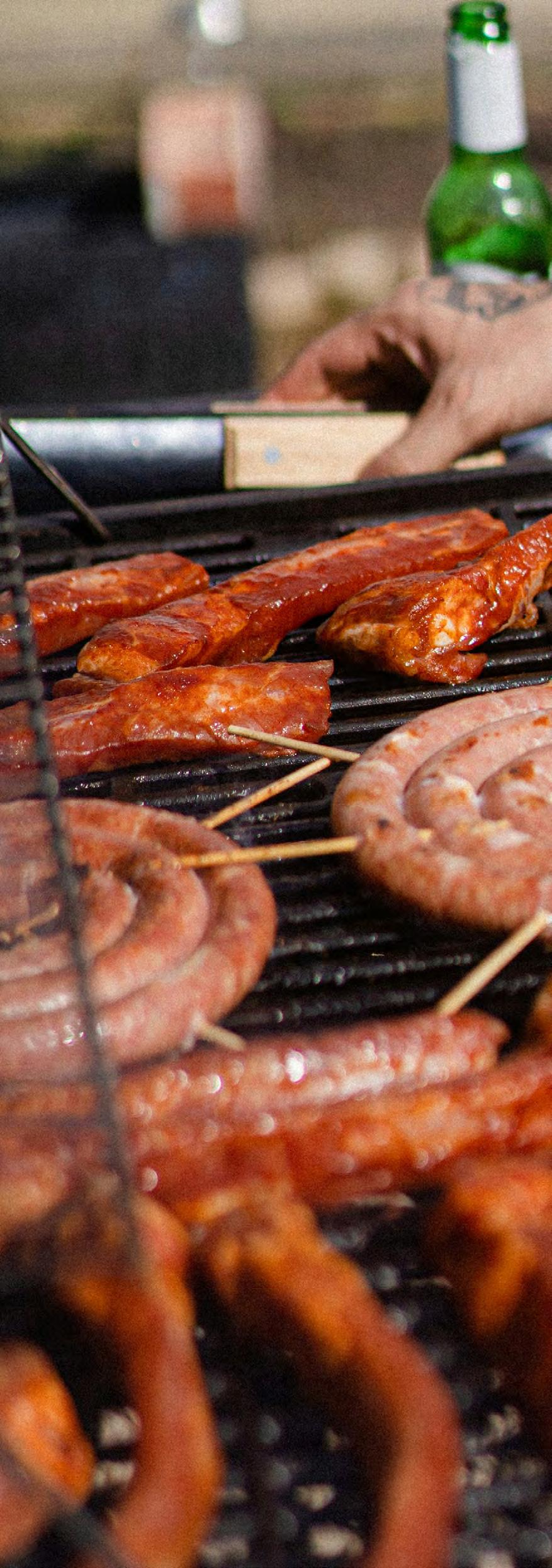


Fast forward to today, and we see a modern obsession with protein to build muscle—from milkshakes to Mars bars, everything seems to be high protein these days. According to nutritionist Federica Amati, quoted in The Guardian, male clients “often set unnecessarily high protein targets, which they struggle to meet.”12
Essentially, for some, meat is seen to prove their masculinity, while plant-based diets are often viewed as feminine, leading to stigma for men who choose them. This connection to traditional gender roles can make it harder for some men to reduce their meat intake, even if they have health or ethical reasons to do so.13
"No one wants to be the guy in the pub ordering a veggie burger.”
- Andrew, Hubbub Vegcurious participant
And there’s a social aspect at play, too. Meat often plays a key role in bonding and reinforcing masculine norms.
According to our research, younger men, aged 16-24, are significantly more likely than men in general to say they’d feel uncomfortable eating plant-based food with friends and family. That’s 17% compared to 11% of all men, and 10% of the total UK population.14
Proportions of people who feel uncomfortable eating plant-based food with friends and family:
17% of young men aged 16-24 of all men 11%
Research shows the link between eating meat and masculinity is particularly strong in Western cultures. Men’s Health Network point out that men are less likely to want to cut back on meat and are less likely to be vegetarian or vegan.
Think about the stereotypes we keep around social gatherings: the bloke ‘manning’ the BBQ, the man of the house carving up a roast, and curry with the lads. These aren’t just meals; they’re social rituals. Last year, Men’s Health Network found that barbecuing is perceived as “the epitome of masculinity.”15
10% total UK population

This goes beyond simple preference; it’s deeply tied to identity. This is where emotional triggers come into play.
Stress related to masculinity, or a strong adherence to traditional gender roles, can significantly influence food choices. Maintaining a sense of masculinity through food is a priority for some men, regardless of whether they perceive themselves as ‘high’ or ‘low’ in masculinity. A 2009 study demonstrated this: when men were given false feedback about their perceived masculinity, both those told they were ‘high’ in masculinity and those told they were ‘low’ chose meat pizza over veggie pizza, and ate more of it, when they wanted to appear more masculine.16

Hubbub’s Meat Your Match, an 8-week behaviour change trial, challenged fitness conscious men to halve their meat consumption and replace it with plant-based protein. The campaign used positive, peersupported behaviour change techniques, focusing on what participants could gain rather than lose. It framed the shift around fitness, energy, and performance—key motivators for the audience—while avoiding ‘preachy’ messaging. Clear goals, personalised nutrition plans, group support via WhatsApp, and gamification (like fitness tracking) kept participants engaged.
"The challenge is a good opportunity to rethink what I’m putting in my body.”
-
Meat Your Match participant
80% successfully halved their meat intake
86% planned to maintain the change after the challenge
Focusing on personal health and performance, alongside simple, achievable changes, can effectively inspire men to eat less meat.
So, young men are eating more meat...
22% of young men believe human behaviour isn’t the primary cause of climate change
The Covid-19 pandemic and subsequent lockdowns significantly impacted 16-24 year olds at a crucial time in their lives. Remember that today’s 24-year-old was 19 during lockdown, and 16-year-olds were just 11. Faced with limited real-world social interaction, lots of people turned to the internet, where many encountered potentially harmful communities. Hope Not Hate found increased scepticism, distrust of traditional media, and anti-feminist rhetoric during this period.17
And while climate denial remains a minority view, 22% of young men still believe human behaviour isn’t the primary cause of climate change.18
A key factor driving these behaviours is the rise of the ‘manosphere’—a collection of websites, forums, blogs, and vlogs focused on men’s issues and upholding traditional masculine roles. This online space is one often characterised by opposition to feminism and, in the case of many men’s rights activists, extreme misogyny.

Gen Z, as digital natives, are uniquely aware of the internet’s impact on their wellbeing.
A 2024 Craft survey for Channel 4, polling 13–27-yearolds19, found:
48%
were more likely to worry about online time than older generations were more likely to worry about the effects of social media than older generations were more likely to worry about their appearance than older generations


The so-called ‘manosphere’ is having a big impact on how some young men think about food and their identity, especially when it comes to meat. It’s spawned an online subculture where high meat consumption is seen as a sign of strength, masculinity, and dominance. And it’s a belief system being pushed by influential figures in fitness, tech, and self-improvement.

Since 2022, there’s been a clear uptick in people like Joe Rogan, Jordan Peterson, and Andrew Tate promoting ‘carnivore diets’, declaring benefits like better mental clarity and a greater connection with nature. These figures have enormous influence and clout—Andrew Tate, for example, was the world’s third most googled person the year 2023.20 But their endorsements are frequently interwoven with misogynistic and climate-related misinformation, creating a complex and problematic network of influence, amplified by social media algorithms.
In a 2025 ‘Joe Rogan Experience’ podcast featuring Elon Musk, the pair discussed climate change, asserting that meat consumption was ‘irrelevant,’ without providing scientific evidence.21 That podcast alone garnered 19 million views on YouTube.
In the manosphere, high meat consumption is seen as a sign of strength, masculinity, and dominance.

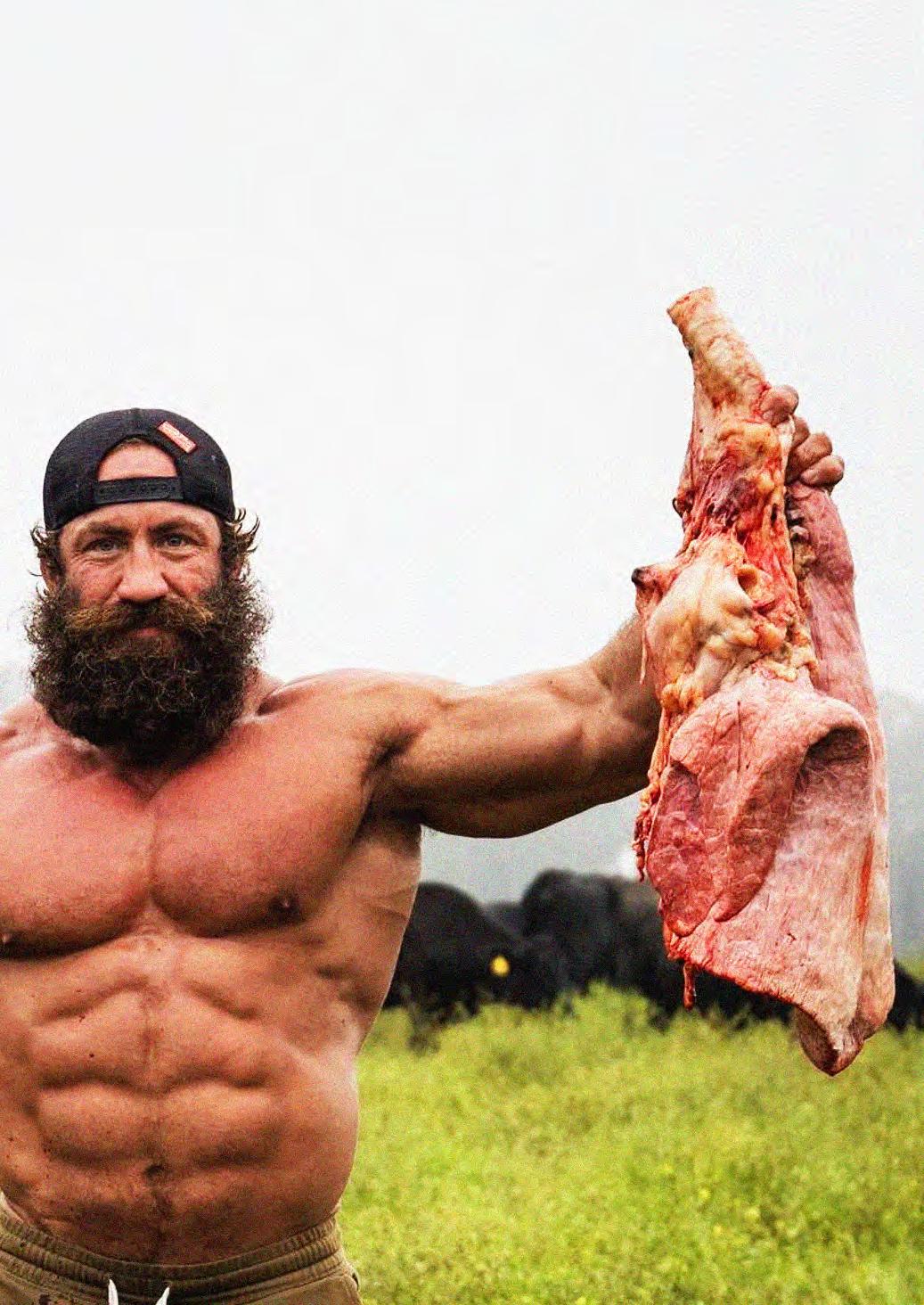
Source: Liver King / Facebook
Meanwhile, the portrayal of meat consumption has become increasingly extreme. Influencers like Brian Johnson, known as ‘The Liver King,’ show off raw-meat feasts and bow-and-arrow hunts to millions of Instagram followers. And then there’s Eddie Abbew, a British exbodybuilder with a significant TikTok audience, who promotes extreme protein intake, by suggesting his followers eat 12 eggs a day and add duck fat and liver to their protein shakes. Though both Eddie and Brian built followings by promoting extreme protein for seemingly unattainable physiques, they've both admitted to steroid use.22

A major concern is the spread of misleading nutritional information. Influencers often exaggerate protein requirements and the necessity of meat, while dismissing plant-based protein sources. This can lead some young men to see plant-based diets as inadequate for muscle development and even as a threat to their masculine identity. Advocates for plant-forward diets have got the ‘soy-boy’ stereotype and the myth of ‘incomplete proteins’ to contend with. And, of course, the perception of plant-based diets as ‘feminine’ just adds fuel to the fire.



Hubbub’s Protein Pressures project looked at how to get men talking about meat consumption and its effects on health, the environment, and society.
We found meat is strongly linked to masculinity, with some men seeing it as crucial for strength and health. This is reinforced by cultural norms that portray meat as ‘natural’ and ‘necessary,’ especially for building muscle. However, men are also motivated to cut back by health concerns, cost, and trying plantbased alternatives.
To encourage many men to eat less meat, we should focus on personal reasons like health and cost, rather than starting with environmental or ethical arguments. Sharing simple, tasty plant-based recipes, challenging the idea that meat equals masculinity, and highlighting life changes that might prompt new habits all had the potential to shift behaviours.

"We’re probably programmed as a species to go for meat, somehow. There’s a conditioning there. The more meat you eat, the more masculine you’re going to be. That’s just how people are.”
- Protein Pressures workshop participant

Recent research suggests that Gen-Z is showing signs of a growing gender divide, particularly when it comes to their attitudes on politics and social issues. According to research from Thinkhouse,23 young women are increasingly identifying with liberal viewpoints, while young men are leaning towards more conservative views.
This divergence is striking when you look at perceptions of women’s rights. Research from Craft and Channel 4 in 202524 found that nearly half of male respondents aged 13-27 felt that efforts to promote women’s equality have gone too far
% of young men that think women are as capable as men at being leaders:
and are now disadvantaging men, in stark contrast to young women’s more progressive views on gender equality. Likewise, research from Kantar shows that the percentage of young men that think women are as capable as men at being leaders has plummeted from around 80% in 2020 to nearer 50% in 2025.25
23 Thinkhouse, 2024
24 Craft for Channel 4, 2025
25 Women as Workplace Leaders by Kantar Media, 2025
"Meat consumption among young men is strongly influenced by gender norms. Studies link meat-eating with traditional masculinity, while plant-based diets are often viewed as feminine, leading to social exclusion of men who adopt them."
-
Vegan Society, 2023
The gap extends to environmental engagement as well. Men tend to express less concern about environmental issues, and young women are significantly more active in seeking out and interacting with environmental content online.26
It’s undeniable that young people’s beliefs are growing increasingly polarised, and the reasons are plain to see: their online experiences are becoming more fragmented. Social media algorithms play a significant role: by tailoring content to reinforce existing beliefs, these algorithms effectively create echo chambers.
Meanwhile, there’s anecdotal evidence that users on platforms like TikTok and Facebook are seeing different comments on the same content as their peers, with the comments they see aligning with their own beliefs. This limits their exposure to different perspectives and creates a sense of disconnect with little opportunity for common ground.
26 Kantar TGI Data, December 2024

50% of young men feel that efforts to promote women’s equality have gone too far 24

To encourage young men to eat less meat and more plants, we need realistic, evidence-based approaches that meet them where they are. That means creating products, campaigns, and messages that speak directly to their needs, motivations and barriers.

Products and packaging should appeal to young men without hitting them over the head with environmental messaging. Take Heura, the Spanish market leader for plant-based meat, who market their products as ‘the protein of the future’—tapping into many young men’s desires to be tech-savvy trend spotters.

Huel has connected with many young men by focusing on what matters to them: the practical, personal benefits. They’re leading with high-protein, ‘complete nutrition’ products that address muscle and performance, not environmental concerns. They’ve built a strong online community with social media and fitness influencers, where peers share tips and recipes, making it feel relatable and achievable. Plus, they keep it affordable at £3.25 a meal (as of April 2025). This makes it relatively easy for young men to try Huel and essentially give plant-based a go, without necessarily realising it. It’s about convenience, taste, and performance first, with sustainability benefits as a bonus.

% of young people who would not be open to trying plant-based meat: 24% of men 15% of women
Some young men are particularly resistant to trying plant-based meat. Almost a quarter of them (24%) say they wouldn’t be open to trying plant-based meat, compared with just 15% of women of the same age.27 So solutions need to recognise their priorities: health, fitness, protein and price.

First, health and fitness are huge. Many young men are focused on diets that support muscle growth, strength, and overall fitness. In our ‘Protein Pressures’ report, we saw a strong belief that meat is the superior protein source for muscle development, providing unique nutrients that plant-based options struggle to match. However, our ‘Meat Your Match’ campaign showed that when participants actively pursued health goals like improving physique and energy levels by reducing meat and boosting plantbased proteins, they reported positive changes like increased energy, better digestion, and weight loss. And research shows that plantbased diets may offer cardiovascular protection for endurance athletes too.28
Second, protein content and sources are a central concern for some young men. Meat is often seen as the primary, most effective protein source for muscle growth. But studies show that eating a plantbased diet high in protein, with whole foods and added soy protein, builds muscle strength and size just as well as a mixed diet with whey protein.29 Our study, ‘Meat Your Match’ showed that a lot of young men lacked awareness about plant-based proteins. But, importantly, after some education and exposure, participants significantly increased their understanding of protein diversity. This led to an average 38% increase in their consumption of plant-based proteins.

Finally, cost and convenience heavily influence many young men’s choices. Hubbub’s ‘Protein Pressures’ report found that reducing meat intake was often driven by financial pressures. Meat is perceived as an expensive staple for many, whilst purchasing fruit and veg is generally affordable, particularly in high-income countries like the UK.29 Convenience is also a big factor. Participants in the ‘Meat Your Match’ challenge struggled with meal planning and preparing plantbased meals due to time constraints and a lack of familiarity with non-meat protein sources, which suggests we need to show how it can be easy and enjoyable, especially since many young men aged 16-24 feel they lack the cooking skills to cook plant-based foods.30
27 Hubbub, November 2024
28 Viroli et. al, 2023
29 Barnard et al, 2019
30 Hubbub polling May 2023 - November 2024 (12,013 respondents)

It’s not just about building muscle; we need to highlight the wider benefits, like improved skin health, better sleep, gut health, and faster recovery. It’s crucial to focus on the variety a plantforward diet offers: It’s not about cutting out meat entirely, but about adding more beans, nuts, vegetables, and other plant-based foods.
Hubbub, in partnership with M&S, conducted the Sparking Change trial to help their customers give plant-based eating a go. By combining expert insights, such as a Plant-Based Protein Tips guide and a live M&S nutritionist workshop, with proven behaviour change techniques like goalsetting and social support, the trial made plant-based eating feel achievable.
Participants engaged in a practical cook-along and explored easy plant-based swaps, directly reducing meat consumption.
Impact of Sparking Change:
90% reduced meat intake, with many limiting it to 1-2 times per week
"It gave me the chance to try things I wouldn’t normally try. I really like the Plant Kitchen Oat
Drink—it’s my go-to milk now.”
- Sparking Change participant
reported feeling healthier 84% 75%
increased their consumption of plant-based foods
Key Learning Clear, practical information and community support effectively drive lasting dietary shifts.

Using trusted figures and connecting messages to relevant identities is key. In 2020, Quorn teamed up with Liverpool FC, becoming their Official Sustainable Protein Partner, to encourage fans, especially young men, to consider cutting back on meat. They made vegetarian and vegan options more available at Anfield Stadium during games, focusing on making those choices feel approachable and desirable. This was followed by the 2021 ‘Meat-Free Match Days’ campaign, which included meat-free pies and endorsements from players. Quorn’s own research showed that 74% of fans were interested in sustainable food at games, and 56% were already eating less meat.31
Instead of overwhelming people with labels, we need to make plantbased meals a natural choice, by focusing on offering more highprotein, vegetable-rich options that fit into existing dietary habits. A stealth strategy can also be effective to normalise plant-based eating, particularly in traditionally masculine spaces like sports events and gyms. Integrating plant-forward options without fanfare, by blending plant-based ingredients into familiar dishes, or not making it the central selling point, can make new foods easier to swallow.
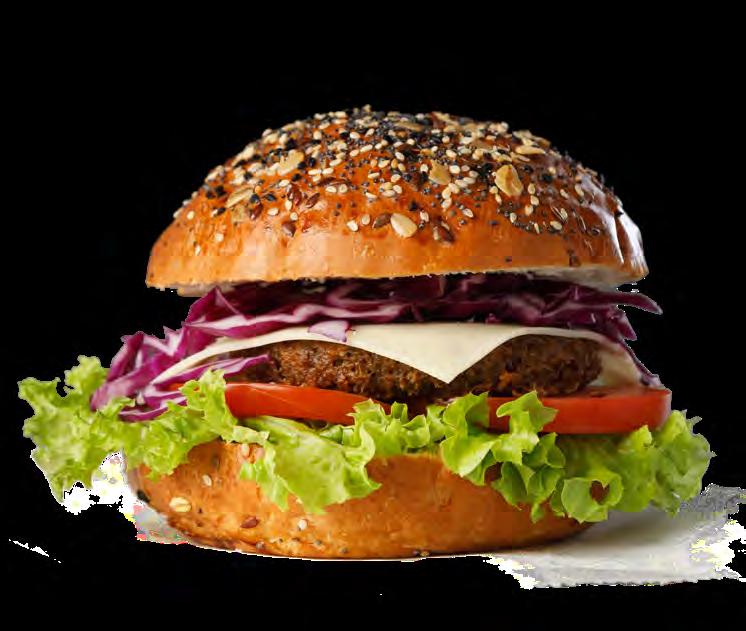
Levy: every burger makes a difference
Levy (the sport, leisure and hospitality arm of Compass UK & Ireland) provide food for top-class sporting venues across the UK and Ireland, often targeting a male audience. They helped normalise more ‘plant-rich’ options by creating their ‘Signature’ 50:50 burger where 50% of beef was swapped for mushrooms, beans and kale whilst, crucially, still being delicious. Levy report that this burger alone has helped cut the carbon intensity of the 1.5m burgers they sell each year by 33% per burger, from 5.5kg CO2e to 3.7kg CO2e, all whilst maintaining taste.32
If we’re going to effectively address the false nutrition claims prevalent in fitness and diet culture, it’s crucial to acknowledge the power of peer influence and consider how successful interventions can be adapted to shift behaviours in this context. There’s lots we can learn from other misinformation-countering strategies employed in other sectors, such as counter-terrorism, public health, and gender equality, to identify transferable approaches that can be applied to combat nutrition misinformation.
Young men with misogynistic views are highly susceptible to online influence, for better or worse. Kantar’s research shows men aged 15-24 who doubt women’s leadership abilities are easily swayed by online views and comments. They also consume more media than most adults.33

Educational institutions have a key role to play in fostering a greater understanding of the link between meat consumption and climate change. There’s an opportunity for schools and colleges to educate their students on food systems and their environmental impact. Caterers and food suppliers serving schools should ensure plant-based options are readily accessible—organisations like Chefs in Schools are providing practical experience and normalising plant-based choices, and need more support and resource.
Beyond education, retailers and the hospitality sector have a huge role to play in making plant-based food mainstream. We’re already seeing great examples on the highstreet: Wahaca and Wagamama’s are leading the way with half of their menus vegetarian or vegan, and IKEA is working towards hitting the same target this year. Even Burger King, known for meat, has pledged to have half of its menu meat-free by 2030. The key is making these options tasty and appealing. Just adding a ‘veggie burger’ isn’t going to cut it; good names and smart menu placement are essential.
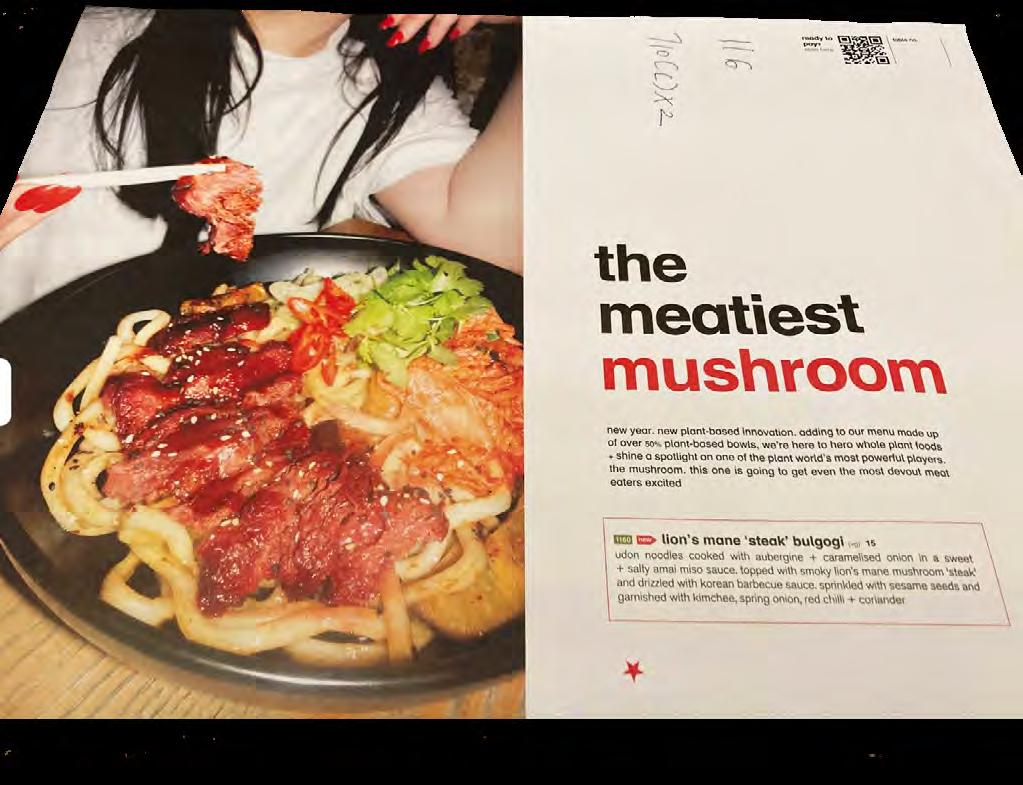
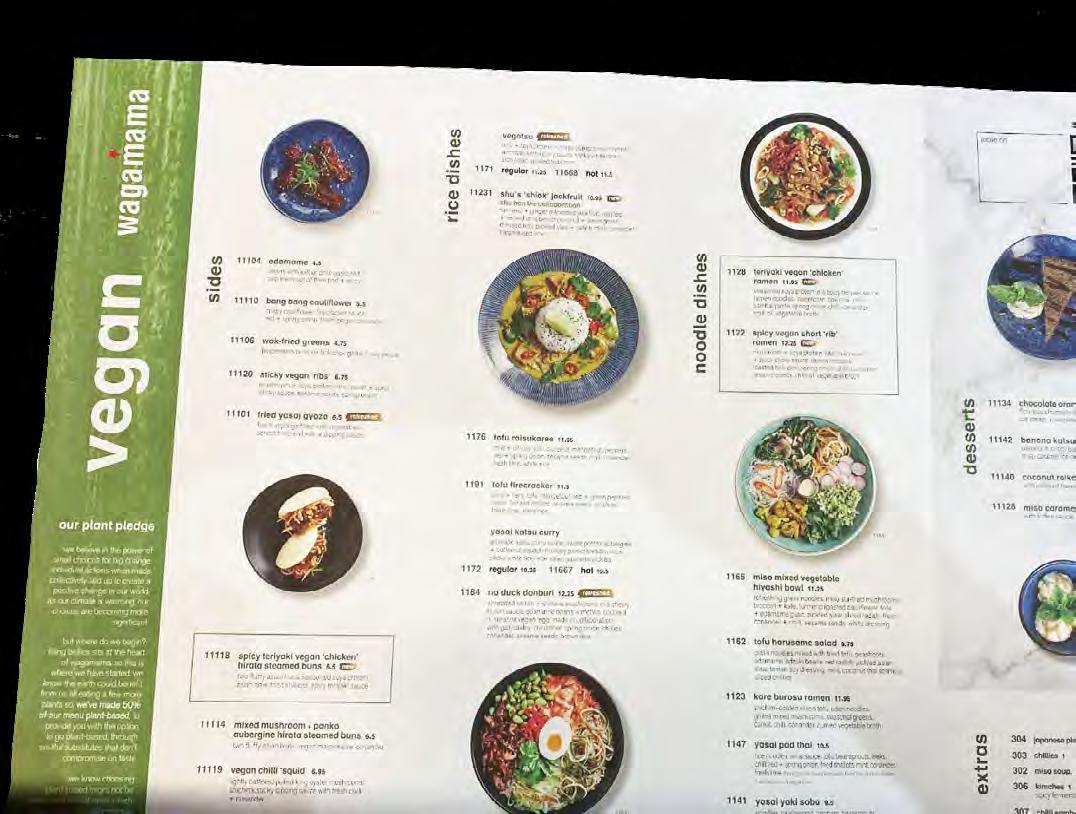
At Hubbub, we’re not about telling anyone what to eat. This is about figuring out why some young men are leaning so heavily into meat, and how we can give them the tools to make sustainable choices without feeling judged. If this trend is a sign we’re going backwards, then the food industry, government, and civil society need to act with urgency. We need to shift the narrative, moving plant-based eating away from an ideological battleground into a
natural, positive choice. Everyone— businesses, policymakers, and NGOs—has a part to play in making that happen. By working together, we can ensure that plant-based options are seen as a desirable and accessible part of a healthy lifestyle, rather than a forced alternative.
If you want to talk about how this might affect your work, or if you’re keen to team up with Hubbub to tackle this, get in touch.



Thanks to Beyond Equality, The British Nutrition Foundation and the7stars whose data and expertise helped us develop this report.
Thank you to Just Eat for hosting our launch event.
Finally, we appreciate the support from Kristin Bash MPH FFPH, SOS (Students Organising for Sustainability), The Food Foundation, the Better Business Network, and everyone who participated in our ‘Meat and Masculinity Catalyst Conversation’ at the Better Business Summit 2024.
